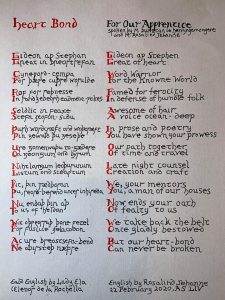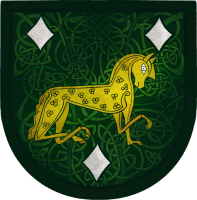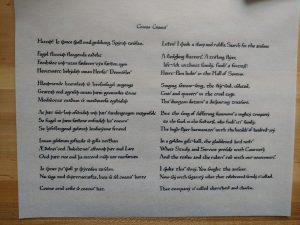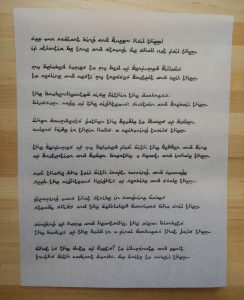
Before Gideon ap Stephen was Laurelled at Ymir 2020, Mistress Rosalind asked me to translate the poem she had written to release Gideon from his apprenticeship into Old English. I happily did so — I love translations and find it a great challenge! Below is the text that I sent her; I also sent her a (very rough) recording for pronunciation. While I usually don’t use ċ (/ch/) or ġ (/j/) in my translations as they are entirely a modern conceit for transcription, I included them here to help indicate the pronunciation differences from c (/k/) and g (/g/) for performance.
| Original | Translation |
| Gideon ap Stephen great of heart | Gideon ap Stephen great in breostsefan |
| A word-warrior for the Knowne World | Cyneword-ċempa for þære cuþre worulde |
| Famed for ferocity in defense of humble folk | Rof for reþnesse in randġebeorh eadmede-folces |
| Awesome of hair a voice ocean-deep | Seldlic in feaxe stefn ġeofon-sidu |
| In prose and poetry you have shown your prowess | þurh wordcræft ond woþcræft þin ġewald þu ġeseþe |
| Our path together of time and travel | Ure gomenwaþu to-gædere on geongum ond byrum |
| Late night counsel creation and craft | Nihtlangum leoþurunum listum ond sceaftum |
| We, your mentors you, a man of our houses | Wit, þin rædboran, þu, reord-berend unċer inhireda |
| Now ends your oath of fealty to us | Nu endaþ þin aþ to us of heldan |
| We take back the belt once gladly bestowed | Wit oþfeorraþ þone fetel fore fuslice ġelacodon |
| But our heart-bond can never be broken | Ac ure breostsefa-bend ne abirsteþ næfre |
| Translation | Translator’s Notes Regarding Particular Choices |
| Gideon ap Stephen great in breostsefan | Breostsefa = mind or heart, literally “the mind in the breast” |
| Cyneword-cempa for þære cuþre worulde | Cyneword-cempa = champion of fitting words |
| Rof for reþnesse in randgebeorh eadmede-folces | Randgebeorh = protection such as that afforded by a shield |
| Seldlic in feaxe stefn geofon-sidu | Seldlic = rare, strange, wondrous, extraordinary, having unusual good qualities Sid = wide, broad, spacious, and is specifically usually applied to the ocean, world, and universe |
| þurh wordcræft ond woþcræft þin gewald þu geseþe | Syntax of second half-line is “your prowess you show” wordcræft = the art of speaking and writing woþcræft = the art of poetry or song gewald = power, mastery (I chose it for the latter meaning) |
| Ure gomenwaþu to-gædere on geongum ond byrum | Syntax of second half-line is “of travels and times”; I chose to make plural because there was presumably more than one Byre has many meanings, but I particularly like the translation of “an event, a favourable time, an opportunity” |
| Nihtlangum leoþurunum listum ond sceaftum | Syntax of second half-line is “craft and creation” nihtlang = night-long leoþurun = counsel conveyed in verse (I thought this meaning was appropriate!) list = art, skill, cunning, craft, artifice |
| Wit, þin rædboran, þu, reord-berend uncer inhireda | Wit = dual for Mistress Rosalind and Master Dunstan reord-berend = fig. person/man, lit. voice-bearer/one gifted with speech in-hired = family, household, house (I liked the triple meaning) |
| Nu endaþ þin aþ to us of heldan | |
| Wit oþfeorraþ þone fetel fore fuslice gelacodon | |
| Ac ure breostsefa-bend ne abirsteþ næfre | Repeating breostsefa from the beginning |


